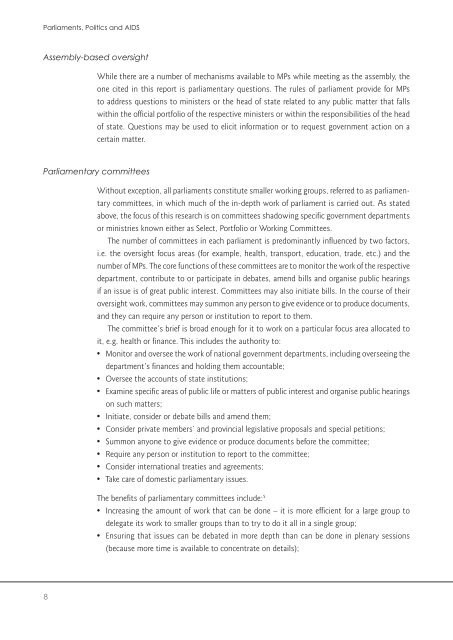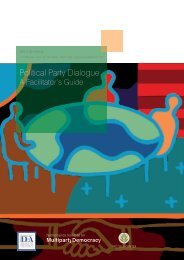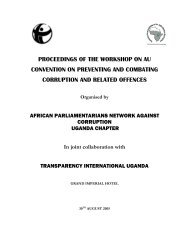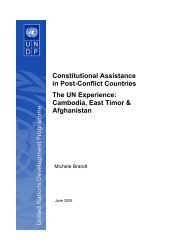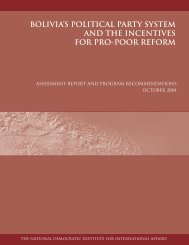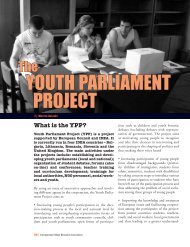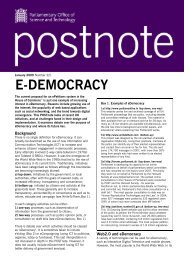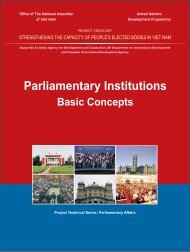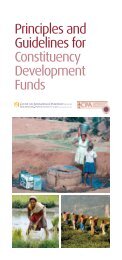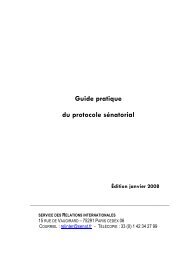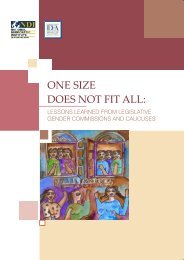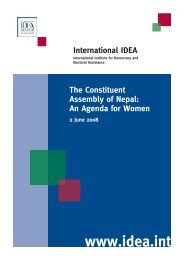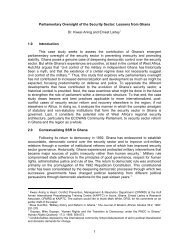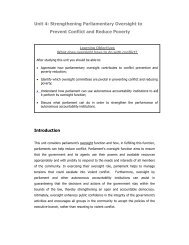Parliaments, Politics and AIDSIllustration: Constitution of South Africa and role of parliamentThe South African Constitution illustrates clearly the distinction between the legislative role ofparliament and its oversight role. In Section 42(3) it states that parliament houses the representativesof the people to ensure ‘government by the people under the constitution’ andinter alia, that the National Assembly ‘…is elected to represent the people and to ensuregovernment by the people under the Constitution. It does this by choosing the president,by providing a national forum for public consideration of issues, by passing legislation andby scrutinising and overseeing Executive action.’ 4At least two other sections expand on and enhance one’s understanding of section 42(3).These are sections 55(2) and 56. Firstly, section 55(2) grants express authority to parliamentto ‘hold organs of state in the national sphere accountable, and to exercise oversight overnational Executive authority and organs of the state’. This sub-section thus empowers theNational Assembly to ‘provide for mechanisms (a) to ensure that all executive organs of statein the national sphere of government are accountable to it; and (b) to maintain oversight of(i) the exercise of national executive authority, including the implementation of legislation;and (ii) any organ of state’.Secondly, section 56 describes the minimum standards of accountability for the exerciseof the above-mentioned oversight. The National Assembly ‘or any of its committees may(a) summon any person to appear before it to give evidence on oath or affirmation, or toproduce documents; (b) require any person or institution to report to it; (c) compel, in termsof national legislation or the rules and orders, any person or institution to comply with a summonsor requirement in terms of paragraph (a) or (b); and receive petitions, representationsor submissions from any interested persons or institutions’.In addition to the above, the National Assembly must ‘(a) facilitate public involvement inthe legislative and other processes of the Assembly and its committees; and (b) conduct itsbusiness in an open manner, and hold its sittings, and those of its committees, in public, butreasonable measures may be taken (i) to regulate public access, including access of themedia, to the Assembly and its committees; and (ii) to provide for the searching of any personand, where appropriate, the refusal of entry to, or the removal of, any person. The NationalAssembly may not exclude the public, including the media, from a sitting of a committeeunless it is reasonable and justifiable to do so in an open and democratic society’.3.3 <strong>Parliamentary</strong> mechanisms and institutions for oversightThe oversight function can be implemented in several different ways. House-based, or internal,oversight occurs while parliament is in session and this is normally via the assembly or parliamentarycommittees.
Parliaments, Politics and AIDSAssembly-based oversightWhile there are a number of mechanisms available to MPs while meeting as the assembly, theone cited in this report is parliamentary questions. The rules of parliament provide for MPsto address questions to ministers or the head of state related to any public matter that fallswithin the official portfolio of the respective ministers or within the responsibilities of the headof state. Questions may be used to elicit information or to request government action on acertain matter.<strong>Parliamentary</strong> committeesWithout exception, all parliaments constitute smaller working groups, referred to as parliamentarycommittees, in which much of the in-depth work of parliament is carried out. As statedabove, the focus of this research is on committees shadowing specific government departmentsor ministries known either as Select, Portfolio or Working Committees.The number of committees in each parliament is predominantly influenced by two factors,i.e. the oversight focus areas (for example, health, transport, education, trade, etc.) and thenumber of MPs. The core functions of these committees are to monitor the work of the respectivedepartment, contribute to or participate in debates, amend bills and organise public hearingsif an issue is of great public interest. Committees may also initiate bills. In the course of theiroversight work, committees may summon any person to give evidence or to produce documents,and they can require any person or institution to report to them.The committee’s brief is broad enough for it to work on a particular focus area allocated toit, e.g. health or finance. This includes the authority to:• Monitor and oversee the work of national government departments, including overseeing thedepartment’s finances and holding them accountable;• Oversee the accounts of state institutions;• Examine specific areas of public life or matters of public interest and organise public hearingson such matters;• Initiate, consider or debate bills and amend them;• Consider private members’ and provincial legislative proposals and special petitions;• Summon anyone to give evidence or produce documents before the committee;• Require any person or institution to report to the committee;• Consider international treaties and agreements;• Take care of domestic parliamentary issues.The benefits of parliamentary committees include: 5• Increasing the amount of work that can be done – it is more efficient for a large group todelegate its work to smaller groups than to try to do it all in a single group;• Ensuring that issues can be debated in more depth than can be done in plenary sessions(because more time is available to concentrate on details);
- Page 1 and 2: Parliament,Politics and AidsA Compa
- Page 3: This report is a synthesis report f
- Page 6: AcknowledgementsThis research proje
- Page 9: TablesPageTable 1 Women representat
- Page 13 and 14: Parliaments, Politics and AIDSan op
- Page 15 and 16: Parliaments, Politics and AIDS2.3 S
- Page 17: Parliaments, Politics and AIDS3. Th
- Page 21 and 22: Parliaments, Politics and AIDS3.4 O
- Page 23 and 24: Parliaments, Politics and AIDSA wel
- Page 25 and 26: Parliaments, Politics and AIDSTable
- Page 27 and 28: Parliaments, Politics and AIDSBasic
- Page 29 and 30: Parliaments, Politics and AIDS5.7 L
- Page 31 and 32: Parliaments, Politics and AIDSWhile
- Page 33 and 34: Parliaments, Politics and AIDS6.5 P
- Page 35 and 36: Parliaments, Politics and AIDSimple
- Page 37 and 38: Parliaments, Politics and AIDSAcron
- Page 39 and 40: Parliaments, Politics and AIDSEndno
- Page 41: The HIV/AIDS pandemic is increasing


